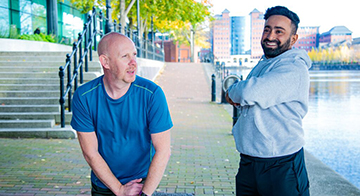Dr Colin Preece, Teladoc’s Head of Mental Health, shares with us his top tips about how to keep your brain healthy and active. By incorporating these simple strategies into your daily life, you can help keep your brain sharp, boost your memory, and improve your overall well-being.
Maintaining a healthy brain during a lifetime should be one of our uppermost goals. The human brain is incredibly complex and can be considered as the ‘control centre’ for the nervous system. It enables thoughts, memory, movement, and emotion. It's place at the pinnacle of evolutionary biology means that we do not yet fully understand how it works. The fact that we need to protect it, keep it as healthy as possible during our lifespan though is beyond question.
Genetics undoubtedly play a role in brain health and cognitive decline as we age but the encouraging news is research shows we can make a positive difference in improving brain health, limiting cognitive decline, and improving cognitive fitness.
I'll share some simple strategies you can incorporate into your daily life, to maximise your chance of keeping your brain healthy and active.
Protect your head
Protecting ourselves from head injury should be part of everyday life. Evidence shows that concussion can harm the brain both in the short and long term. Wearing appropriate protective headgear is advisable when cycling, skiing, skating or other activities when impact may occur.
Learning is key
Our brains crave novelty and are designed to learn. Developing a new skill, like a language, instrument, or even a dance routine, encourages the creation of new neural pathways. This not only improves memory and focus but also fosters a sense of accomplishment and boosts confidence.
Embrace the power of play
Cognitive flexibility can be enhanced by puzzle solving crosswords, brainteasers or Sudokus. These activities challenge your brain to think critically and creatively. Consider games that involve strategy or quick thinking, like chess or board games, for an added cognitive workout.
Fuel your brain
We recognise that good nutrition is important for our physical health and this impacts on our brain function. Select a balanced diet rich in fruits, vegetables, whole grains, and lean protein. Studies have shown that a Mediterranean style diet can minimise adverse effects on memory and decrease incidents of Alzheimer’s and dementia. Additionally, it is important to stay hydrated as dehydration is linked to lack of focus and concentration.
Get regular exercise to sharpen your mind
Physical activity isn't just good for your physical health; it's a potent brain booster. Exercise increases blood flow to the brain enhancing cognitive function. Brisk walking, swimming, or dancing are all excellent choices.
Prioritise quality sleep
Aim for 7-8 hours of quality sleep each night. Establish a consistent sleep schedule, create a relaxing bedtime routine, and ensure your sleep environment is cool, dark, and quiet.
Socialise and connect
Social interaction is vital for mental well-being and cognitive health. Spending time with loved ones, participating in social activities, or even volunteering in your community stimulates the brain and combats feelings of loneliness, which can negatively impact mental health.
Manage stress
Chronic stress can wreak havoc on your cognitive function and emotional well-being. Finding healthy ways to manage stress is crucial. Practice relaxation techniques like mindfulness, meditation, deep breathing exercises, or progressive muscle relaxation. Engaging in activities you enjoy, whether reading, spending time in nature, or listening to music, can also significantly reduce stress levels.
Embrace mindfulness
Mindfulness practices, like meditation, help you focus on the present moment and cultivate a sense of calm. Mindfulness reduces stress, improves emotional regulation, and enhances focus and concentration. Numerous apps and online resources are available to help you get started with meditation.
Don't neglect regular check-ups
Schedule regular check-ups with your doctor. Early detection and management of underlying medical conditions like hypertension or diabetes can significantly impact cognitive health. Don't hesitate to discuss any concerns you may have about your mental wellbeing with your doctor and remember to check the eligibility of health screenings on your health insurance policy.
Dr Colin Preece, Teladoc Health
Colin Preece is a Chartered Psychologist, Psychotherapist and Counsellor. Following a career in the British police service he has supported athletes in psychological preparation for competitive events including the gaining of multiple gold medals at successive Olympic games. Colin is passionate about education, having taught psychology at both university and secondary school level. He is currently a clinical lead at Teladoc Health, leading a team providing high quality mental health care to a diverse patient group. He has specific interests in education, stress and performance under pressure.




